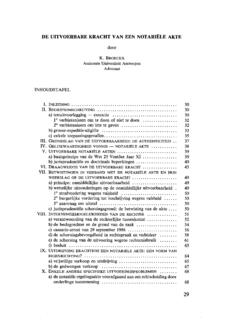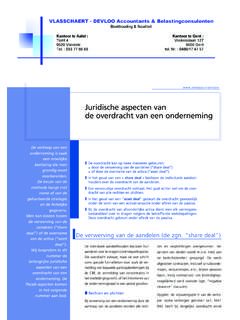Transcription of Een Nederlandse schuldeiser heeft een vordering …
1 NIPR 2015 Afl. 2 / p. 1 van Barten* en van het Kaar** Grensverleggend derden-beslag: over de reikwijdte van een Nederlands beslagverlof onder de Herschikking Brussel IAbstractThis article deals with the new opportunities that the revised Brus-sels Regulation ( Recast ) may offer to claimants who wish to obtain a Dutch pre-judgment garnishee order against garnishees located in other Member Under the former Brussels Regulation, the recognition and enforcement of ex parte provisional measures in another Member State than that of the courts ordering the measures fell outside the scope of Chapter III Brussels Regulation in accor-dance with the case law from the European Court of Justice (De-nilauler/Couchet).
2 The Recast, in contrast, allows the enforcement of ex parte garnishee orders in other Member States, provided the court issuing the order has jurisdiction as to the subject-matter of the proceedings. However, the enforcement of a Dutch ex parte gar-nishee order in other Member States may give rise to practical dif-ficulties. The Recast requires the ex parte judgment to be served upon the debtor before the enforcement (garnishment) takes place. It may therefore prove to be difficult for claimants to ensure that garnishment will take place only shortly after the garnishee order was served on the debtor in order to prevent the dispersal of funds by the debtor.
3 It is argued that these problems may be solved by good coordination between the competent enforcement authorities of the Member States. However, in all likelihood, successful coordination by the creditor is only possible in the event of a limited number of garnishees involved. In light of this abolition of impediments at the European level, the article considers whether Dutch national procedural law may re-strict courts in the Netherlands from issuing extraterritorial gar-nishee orders against garnishees who do not have their domicile in the Netherlands. Based on the current guidelines and case law it is to be expected that the Dutch courts will exercise restraint when dealing with a request for an extraterritorial order.
4 It is argued that, although Dutch law does require a certain connection with Dutch territory, the said connection may also be established if the creditor can make a reasonable case that one of the anticipated garnishees has its domicile within the Netherlands and that there are clear in-dications that the funds will be dispersed. This could, for instance, succeed if the debtor and garnishee are in a close relationship to one another ( a parent company and its subsidiary).It remains to be seen whether the Dutch courts are willing to issue orders against garnishees outside the Netherlands. If they are, this jurisdiction may soon offer a solution for creditors of Dutch parent companies having claims against their subsidiaries in other Member States.
5 In the Netherlands it is relatively easy to obtain a prejudg-ment garnishee order. Under the Recast, even EU jurisdictions not familiar with a pre-judgment garnishee order will have to recognize and enforce a Dutch order. 1. Inleiding Een Nederlandse schuldeiser heeft een vordering op een Nederlandse schuldenaar. De schuldenaar staat in een con-cernverhouding tot verschillende derden (dochter-vennoot-schappen). Een aantal derden is gevestigd in andere EU-lidsta-ten en n in Nederland. De schuldenaar heeft verschillende intercompany vorderingen op alle derden, waarbij de derden geld van de moedervennootschap onder zich houden.
6 De Ne-derlandse schuldeiser (beslaglegger) is voornemens om con-servatoir beslag te leggen onder de Nederlandse dochterven-nootschap. Daarnaast wil de schuldeiser tevens onder de in de andere lidstaten gevestigde derden beslag leggen op vorde-ringen die de beslagdebiteur heeft op die derden. In het kader van deze casus wordt ervan uitgegaan dat de vorderingen van de beslagdebiteur op de buitenlandse derden in het buiten-land betaalbaar zijn. Voorts zal ervan worden uitgegaan dat de Nederlandse rechter internationale bevoegdheid toekomt om van het bodemgeschil kennis te nemen. Bij het leggen van dit conservatoir beslag rijst de volgende vraag: Is het mogelijk om bij de Nederlandse rechter direct een beslagverlof te vragen dat zich (tevens) uitstrekt over vermogensbestanddelen die zich bevinden in an-dere EU-lidstaten?
7 Bovenstaande vraag is niet Echter, recente ontwikke-lingen in het Europese procesrecht vormen aanleiding om dit onderwerp nogmaals de revue te laten passeren. Ten eerste, is in 2012 de Verordening tot herziening van de EEX-Verorde-ning3 (hierna: Herschikking) aangenomen. De Herschikking is op 10 januari 2015 in werking getreden en heeft de EEX-Verordening4 (hierna: EEX-Vo) vervangen. De Herschikking voorziet onder meer, in wijzigingen op het vlak van de er-kenning- en tenuitvoerleggingsregeling van de EEX-Vo. Een aantal van deze wijzigingen heeft betrekking op voorlopige en bewarende maatregelen en heeft mogelijke gevolgen voor de erkenning en tenuitvoerlegging van een Nederlands be-1 Regulation (EU) No.
8 1215/2012 of the European Parliament and of the Council of 12 December 2012 on jurisdiction and the recognition and en-forcement of judgments in civil and commercial matters (recast), OJ 2012, L 351/1. In 2017 the European Account Preservation Order Regulation will be applicable with regard to banks within the EU (with the exception of Denmark and the United Kingdom): Regulation (EU) No. 655/2014 of the European Parliament and of the Council of 15 May 2014 establishing a European Account Preservation Order procedure to facilitate cross-border debt recovery in civil and commercial matters, OJ 2014, L 189 Zie onder andere Broekveldt, Derdenbeslag, Serie Burgerlijk Proces & Praktijk, Deventer: Kluwer 2003, p.
9 913 ; van t Kaar, Het Europees bankbeslag en het Nederlands conservatoire derdenbeslag in Europees ver-band , NIPR 2011, p. 642; Vos, De herschikking van Brussel I, kansen voor extraterritoriaal (conservatoir) derdenbeslag? , Beslag en executie in de rechtspraktijk (BER) 2011, afl. 3, p. 18; Atema, De (extra)territoriale werking van het derdenbeslag en de rol van de bank als derde: Grenzen van het derdenbeslag , BER 2012, afl. 6, p. 22; M. Meijsen, Ontwikkelingen in het civielrechtelijk conservatoir beslag in Nederland, Deventer: Kluwer 2013, p. 317 Verordening (EU) nr. 1215/2012 van het Europees Parlement en de Raad betreffende de rechterlijke bevoegdheid, de erkenning en de tenuitvoerleg-ging van beslissingen in burgerlijke en handelszaken (herschikking), PbEU 2012, L 351/1.
10 4 Verordening (EG) nr. 44/2001 van het Europees Parlement en de Raad van 22 december 2000 betreffende de rechterlijke bevoegdheid, de erkenning en de tenuitvoerlegging van beslissingen in burgerlijke en handelszaken, PbEG 2001, L 12/1. * Mr. Barten is advocaat bij Van Steenderen MainportLawyers. Mr. dr. van het Kaar is advocaat bij AKD Advocaten & Notarissen. 2015 Afl. 2 / p. 2 van 8 Grensverleggend derdenbeslagslagverlof in andere EU-lidstaten. Ten tweede, is in 2014 de Verordening tot het invoeren van een Europees bankbeslag5 (hierna: EAPO-Vo) ingevoerd. De EAPO-Vo introduceert een zelfstandige Europese procedure tot het leggen van conserva-toir beslag op banktegoeden bij Europese banken.






